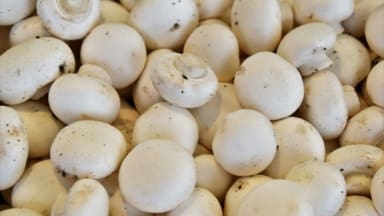
Exclusive to Sainsbury’s, the change in mushroom production will reportedly reduce peat usage by 20,465 tonnes per year, protecting peatlands and supporting the retailer in its goal to reach Net Zero in its supply chain. Importantly, in doing so the retailer has also brought the peat-free discussion right into the domain of the public’s daily shop, bringing the peatland conservation efforts truly into the mainstream.
According to the retailer, mushrooms are one of the most popular fresh produce items with over 1.5 billion portions of them sold each year in the UK (Kantar World, 52wks updated to 01/09/24). Mushrooms are typically grown in two layers of material – first a layer of natural compost and then a layer of peat, the latter playing a key role in the yield and quality of the mushrooms, making it very difficult to replace.
Instead of using peat, Sainsbury’s new mushrooms are grown with an innovative sustainable substrate made from recycled natural materials. Developed in partnership with Sainsbury’s long-term mushroom supplier Monaghan, the new process is a significant change to the growth process, reducing the carbon intensity of mushroom production, leaving peat in the ground, protecting nature and assists the retailer to reach its Net Zero goals. Sainsbury’s has committed to becoming Net Zero across its own operations by 2035, and supply chain by 2050.
The UK government aims to restore 35,000 hectares of peatlands by 2025, and early last year announced a phased reduction in the use of peat in the horticultural sector by 2026, with a complete ban from 2030. The retail sector accounts for 70% of peat sold in the UK. Sainsbury’s is peat-free on their compost and bedding plants, their bulbs sold without peat discs, and perennials, climbers and litre pots are grown using a reduced peat mix.
The new ‘Grown without Peat’ packaged mushrooms will be available in October, across 200+ Sainsbury’s stores across the country. The peat-free mushroom range includes White Closed Cup and White Baby Button variants. According to Sainsbury’s their breakthrough will not only benefit the planet but also customers as the mushrooms are reported to be of “higher quality, firmer in texture, whiter in colour and with a day longer shelf life”.
Richard Crampton, Director of Fresh Food at Sainsbury’s, said: “At Sainsbury’s, we’re committed to playing our part in enabling and driving a resilient and sustainable food system, including protecting nature and reducing carbon to Net Zero. Our new peat-free mushrooms will help us to get another step closer to achieving these goals in our supply chain. We’re proud to be the first supermarket in the UK to bring peat-free mushrooms to our customers, who want easy ways to make more responsible choices when buying food, without compromising on quality. This wouldn’t have been possible without the work of our partner Monaghan who spent 10 years coming up with the alternative.”
Noel Hegarty, Chief Commercial Officer at Monaghan, said: “At Monaghan, we are committed to lowering our climate impact across every facet of our operations. Although mushrooms already have a low carbon footprint in comparison to other foods, we want to take this further with our journey to net zero. Peat-free mushrooms are a huge step forward with that ambition.”
Karl Mitchell, Director of Fundraising at The Woodland Trust, said: “We’re absolutely delighted to hear that Sainsbury’s is introducing peat-free mushrooms as part of its core range. This is a significant step towards protecting our peatlands, which are vital for biodiversity and climate resilience. Peatland restoration is an important part of our work at the Woodland Trust, and our 20-year partnership with Sainsbury’s has been instrumental in making a positive impact on our sites. This latest announcement demonstrates a shared commitment to a sustainable future”
Sainsbury’s has over 600 supermarkets and over 800 convenience stores across the UK.

